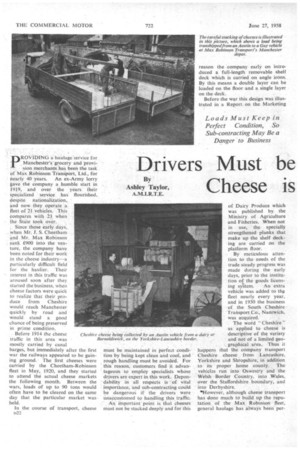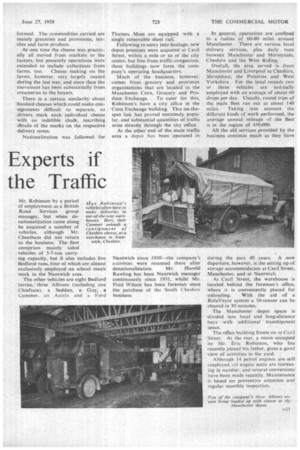Loads Must Keep in Perfect Condition, So Sub-contracting May Be a Danger to Business
Page 66

Page 67

If you've noticed an error in this article please click here to report it so we can fix it.
By Ashley Taylor, A.M.I.R.T.E.
pROVIDING a haulage:service for Manchester's groceryAnd -provi sion merchants has been the task of Max Robinson Transport, Ltd., for nearly 40 years. An ex-Army lorry gave the company a humble start in 1919, and over the years their Specialized service has flourished, despite nationalization, and now they. operate .a fleet of 21 vehicles. This compares with -23. when the State took over.
Since those early days, when Mr. J. S. Cheetham and Mr. Max Robinson sank £900 into the venture, the company have been noted for their work in the cheese industry—a particularly difficult field for the haulier. Their interest in this traffic was aroused soon after they started the business, when cheese factors were quick to realize that their produce from Cheshire would reach Manchester quickly by road and would stand a good chance of being preserved in prime condition.
• Before 1914 the cheese traffic in this area was mostly carried by canal barges, but immediately after the first war the railways appeared to be gaining ground.The first cheeses were carried by the Cheetharri-Robinson fleet in May, 1920, and they started to attend the actual cheese markets the following month. Between the wars, loads of up to 90 tons would often have to be cleared on the same day that the particular market was held.
In the course of transport, cheese n22 must be maintained in perfect condition by being kept clean and cool, and rough handling must be avoided. For this reason, customers find it advantageous to employ specialists whose drivers are expert in this work. Dependability in all respects is of vital importance, and sub-contracting could be dangerous if the drivers were unaccustomed to handling this traffic.
An important point is that cheeses must not be stacked deeply and for this reason the company early on introduced a full-length removable shelf deck which is carried on angle irons. By this means a double layer can be loaded on the floor and a single layer on the deck.
Before the war this design was illus trated in a Report on the Marketing
of Dairy Produce which was published by the Ministry of Agriculture and Fisheries. When not in use, the specially strengthened planks that make up the shelf decking are carried on the platform fl xtr.
By meticulous attention to the needs of the trade steady progress was made during the early days, prior to the institution of the goods licens ing system. An extra vehicle was added to the fleet nearly every year, and in 1930 the business of the South Cheshire Transport Co., Nardwith, was acquired.
The word " Cheshire " as applied to cheese is descriptive of the variety and not of a limited geo .. graphical area.. Thus it happens that the company transport Cheshire cheese from Lancashire, Yorkshire and Shropshire, in addition to its proper home county. The vehicles run into Oswestry and the Welsh . Border Country, into Wales, over the Staffordshire boundary, and into Derbyshire.
'However, although cheese transport has done much to build up the reputation of the Max Robinson fleet, general haulage has always been per formed. The commodities carried are mainly groceries and provisions, textiles and farm produce.
At one time the cheese was practically all moVed from markets to the factors, but presently operations were extended to include collections from farms, too. Cheese making on the farms, however, very largely ceased during the last war, and since then the movement has been substantially from creameries to the buyers.
There is a certain similarity about finished cheeses which could make consignments difficult to separate, so drivers mark each individual cheese with an indelible chalk, inscribing cittails of the marks on the respective delivery notes.
Nationalization was followed for Mr. Robinson by a period of employment as a British Road Services group manager, but when denationalization came along he acquired a number of vehicles, although Mr. Cheetham did not return to the business. The fleet comprises mainly sided vehicles of 5-7-ton carrying capacity, but it also includes five Bedford vans, four of which are almost exclusively employed on school meals work in the Nantwich area.
The other vehicles are eight Bedford lorries,' three Albions (including one Chieftain), a Seddon, a Guy, a Comrner. an Austin and a Ford Thames. Most are equipped with single removable sheet rail.
Following re-entry into haulage, new depot premises were acquired at Cecil Street, within a mile or so of the city centre, but free from traffic congestion, these buildings now form the company's operating headquarters.
Much of the business, however, comes from grocery and provision organizations that are located in the Manchester Corn, Grocery and Pro duce Exchange. To cater for this, Robinson's have a city office in the Corn Exchange building. This on-thespot link has preyed extremely popular, and substantial quantities of traffic arise directly through the city office.
At the other end of the main traffic area a depot has been operated in Nantwich since 1930—the Company's activities were resumed there after denationalization. Mr. Harold Rawling has been Nantwich manager continuously since 1931, whilst Mr. Fred Wilson has been foreman since the purchase of. the South Cheshire bu siness. In general, operations are confined to a radius of 60-80 mile's around Manchester. There are various local delivery services, plus daily runs between Manchester and Merseyside, Cheshire and the West Riding.
Overall, the area served is from Manchester and Liverpool to Cheshire, Shropshire, the Potteries and West Yorkshire. For the local rounds two or three vehicles are normally employed with an average of about 60 drops per day. Usually, round trips of the main fleet run out at about 140
miles. Taking . into account the different kinds of work performed, the average annual mileage • of the fleet is in the region. of 450,000.
All the old services provided by the business continue much as they have
during the past 40 years. A new departure, however, is the setting up of storage accommodation at Cecil Street, Manchester, and at Nantwich.
At Cecil Street, the warehouse is located behind the foreman's office, where it is conveniently placed for unloading. With the aid of a RolaVeyor system a 10-tanner can be cleared in 30 minutes.
The Manchester depot space is divided into local and long-distance bays with additional transhipment space.
The office building fronts on to Cecil Street. At the rear, a room occupied by Mr. Eric Robinson, who has recentlyjoined his father, gives a good view of activities in the yard.
Although 14 petrol engines are still employed, oil engine units are increasing in number, and several conversions have been made recently. Maintenance is based on preventive attention and regular monthly inspectiOn.








































































































































